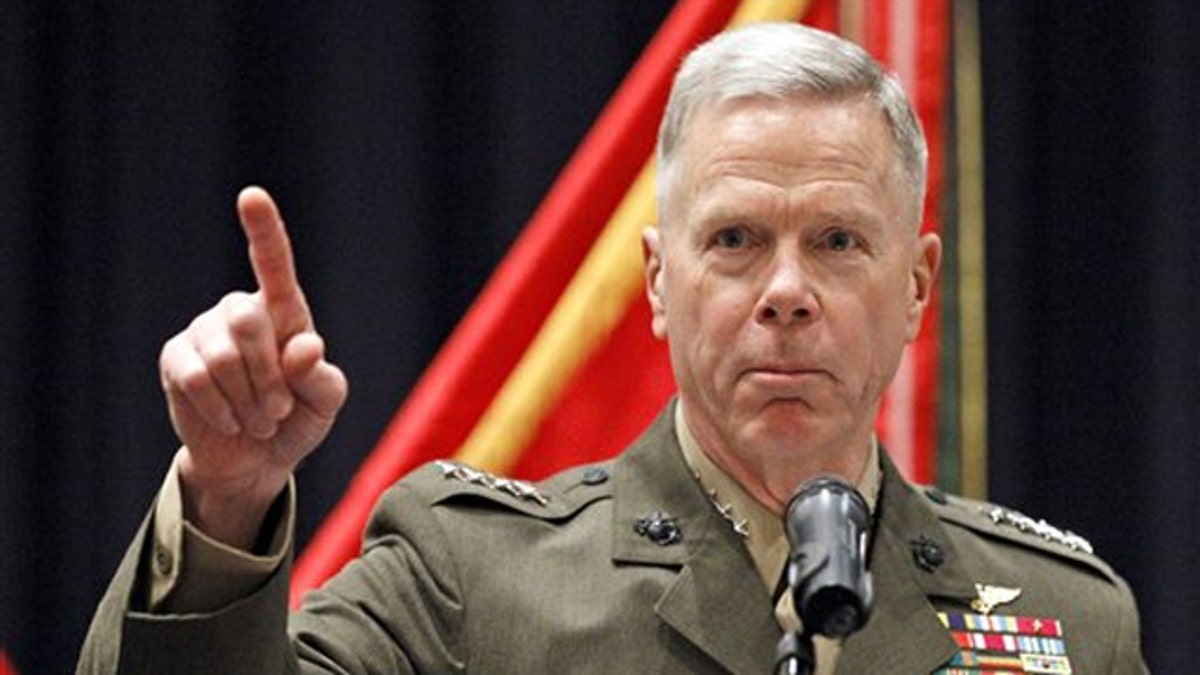
Dec. 1, 2010: Marine Corps Commandant Gen. James Amos speaks at the Marine Corps Barracks in Washington. (AP)
The chiefs of the Army, Marines and Air Force warned Friday that implementing a repeal of the policy banning gays from serving openly in the military would be more difficult than a Pentagon study has suggested, challenging the assessments of other top military officials in the administration.
Gen. James Amos, the Marine commandant, offered the most critical comments in a hearing before the Senate Armed Services Committee and recommended against a repeal at this time. He said the Marines would carry out a change in policy if Congress votes for it but said the shift has a "strong potential for disruption at the small-unit level."
Citing statistics in a recently released Pentagon study showing a majority of combat Marines were concerned about a repeal of "don't ask, don't tell," Amos said he could not turn his back on their opinions.
"(A repeal) will no doubt divert leadership attention away from an almost singular focus of preparing units for combat," Amos said. "We asked for their opinions, and they gave them to us."
"Their message is that the potential exists for disruption of the successful execution of our current combat mission should repeal be implemented at this time," he said.
Army Chief of Staff Gen. George Casey voiced similar concerns about the views of his combat troops and said he also would not recommend changing the law at this time. But he said with the proper planning, the policy could be implemented with "moderate risk." Air Force Chief of Staff Gen. Norton Schwartz recommended deferring implementation until 2012 to give time for training and education programs.
Chief of Naval Operations Adm. Gary Roughead, by contrast, recommended repeal, citing statistics showing most sailors are not concerned about the potential change. As for those worried about a repeal, he said, "I believe these concerns can be effectively mitigated through engaged leadership."
But the assessments from military chiefs speaking on behalf of combat troops in Afghanistan is likely to add fuel to the arguments made by Arizona Sen. John McCain and other Republican lawmakers pushing back against repealing the 1993 law.
Released earlier this week, the Pentagon study found that a minority of troops -- about 30 percent -- predicted potential problems if "don't ask, don't tell" were repealed.
But most of the troops with concerns were serving in combat roles. Nearly 60 percent of troops in the Marine Corps and in Army combat units, such as infantry and special operations, said they thought allowing gays to be open about their sexual orientation would hurt their units' ability to fight on the battlefield.
Defense Secretary Robert Gates and Adm. Mike Mullen, chairman of the Joint Chiefs of Staff, cited findings in the survey that experience with gay troops mitigated most concerns; 92 percent of troops who believed they had served with a gay person did not believe that person's sexual orientation negatively affected unit morale or effectiveness. That number stayed high even among Marine combat arms units, at 84 percent.
"In terms of actual disruption experienced, as opposed to predicted disruption, the distinction between combat arms communities and the force as a whole is negligible," said Marine Gen. James Cartwright, the No. 2 officer on the Joint Chiefs of Staff.
The Associated Press contributed to this report.




